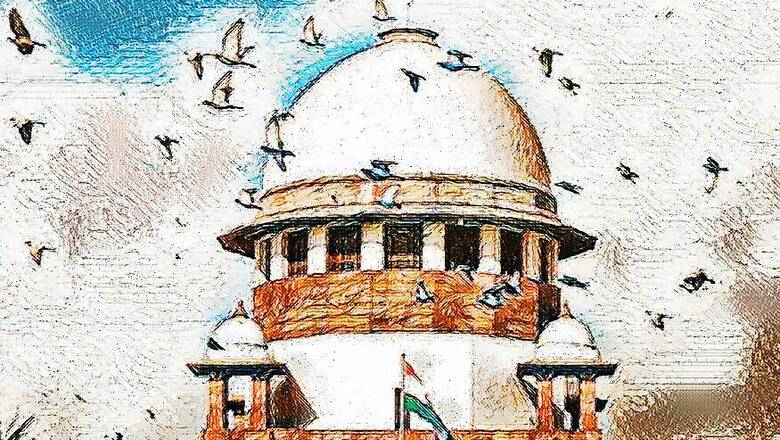
views
New Delhi: Delivering verdict on the correctness of its 2006 judgment in M Nagaraj vs Union of India case, the Supreme Court on Wednesday ruled that states don’t have to collect quantifiable data on ‘backwardness’ for SC/ST quota in job promotions. The court refused to refer the pleas against its 2006 judgment to a larger seven-judge bench.
The Judgement was delivered by a Constitution Bench comprising Chief Justice of India Dipak Misra and Justices Kurian Joseph, Rohinton Nariman, Sanjay Kishan Kaul and Indu Malhotra.
In the case of M Nagaraj vs Union of India, the Supreme Court had laid down the criteria for granting reservation to the members of the SC/ST communities for the purpose of promotions.
The Court had held that while the State governments are not bound to provide for reservations for the benefit of SC/ST communities when it comes to promotions, they must fulfill certain criteria should they choose to implement accelerated promotions for the SC/ST communities.
According to the old verdict, the said policy for reservations could be formed by the State governments based on the following factors: Backwardness of the class; Inadequacy of representation in the Service; and Compliance with Article 335 of the Constitution of India.
The case shaped up when in in July this year, the Attorney General KK Venugopal in another similar matter had told the Bench headed by the Chief Justice of India Dipak Misra that owing to the ambiguity of the Supreme Court’s stance on the issue, a lot of posts in various cadres were going vacant and the issue needed to be addressed at the earliest.
When hearing before the constitution bench began, several questions were raised that touched upon issues like how is backwardness determined, whether backwardness is obliterated once an individual reaches a certain service post, whether the creamy layer concept should be applied to the SC/ST communities also, whether accelerated promotions for a certain community alone go against the idea of equality, need for adequate representation even at top posts in service etc.
The principles laid down by the Supreme Court in three judgments were also debated — Indra Sawhney and others vs Union of India, EV Chinnaiah vs State of AP and M Nagaraj and others vs Union of India and others.
Former Secretary to Government of India, PS Krishnan, who has been working in the field of social justice for SCs, STs, BCs for the last six-and-a-half decades, analyses key questions raised by the Constitution Bench during the previous hearing.
Observation by the Bench: Entry level reservation in employment on the basis of “backwardness” is not a problem. But what is worrying us is the “accelerated promotion to all SC/ST employees without looking into their status of employment.
For example, a person by virtue of reservation gets into IAS and becomes secretary through reservation in promotion. Can a very senior bureaucrat’s grandson and great-grandson be treated as “backward” for promotion in employment, and that too in perpetuity?
Krishnan's take: Reservation for SCs and STs in direct recruitment as well as in promotions are not on the basis of “backwardness”, but on the basis of “untouchability” in the case of SCs, and cultural distinctness and other tribal characteristics in the case of STs.
The confusion between the criterion of “backwardness”, which is applicable to the Socially and Educationally Backward Classes (SEdBCs), and the correct criterion for SCs and STs is repeated again. It is not correct to term reservation in promotion as “accelerated promotion”. It is the process of correction of the imbalance created historically by total denial of their place in administration and governance over the centuries, a process which is yet far from completion. The use of the term “accelerated” gives a wrong impression.
The illustration of a senior bureaucrat’s grandson and great-grandson is inapt and highly speculative and imaginary. This is one illustration of the concept of “Creamy Layer”. The question of “Creamy Layer” does not apply in the case of SCs and STs as per the Mandal judgment.
Before asking whether reservation in promotion should be in perpetuity, the prior question should be whether “Untouchability” and tribal vulnerability will be allowed to continue in perpetuity.
Bench: Whether “Backwardness” of SCs and STs will persist forever, requiring the perpetuation of quotas?
Krishnan's take: The basic issue of “backwardness” being the criterion only for the SEdBCs and “Backwardness” not being the criterion for SCs and STs, for whom the criterion respectively is “Untouchability” for SCs and tribal remoteness and vulnerability in the case of STs, needs to be re-emphasized and brought home.
For correcting the basic social imbalance created by the centuries of caste system and “untouchability” and tribal exploitation, a wide range of measures have to be undertaken. Once this is done, and SCs and STs are equipped by these comprehensive measures to secure their due share on their own strength, the need of reservation will disappear and the fear of reservation continuing in perpetuity will vanish.
Bench (Justice Rohinton Fali Nariman): Suppose there was a caste which was “backward" 50 years ago and now it has sections of creamy layer. Why can’t court say don’t treat unequals as equals.. because the whole idea behind reservation is to give a leg up to those deserving, not to someone who already has both legs up on the fan.
Krishnan's take: Here again, there is confusion on the criterion on “backwardness”. It is not the basis on which the SCs and STs have been identified. The “Creamy Layer” concept, or rather the concept of “Socially Advanced Persons/Sections” of the identified SEdBCs, is not applicable to SCs and STs.
Counsel Shanti Bhushan: If promotions to top bureaucratic posts are to be given through reservation, it will spell disaster for the country.
Krishnan's take: The scary picture of disaster for the country is the personal imagination of the learned counsel. The disadvantage that the country has been suffering from is because the vast majority of people were prevented from developing their inner potential and to participate, through their due presence in administration and governance, in the process of nation-building and national economic progress. This is what is to be corrected by the reservation policy as part of comprehensive Social Justice measures, including reservation in promotion for SCs and STs.
Bench: Three points have emerged for consideration: (i) quantifiable data to assess backwardness; (ii) whether “Creamy Layer” criteria be applied for quota in promotion; and (iii) the adequacy of representation of SC/ST employees in various posts or cadre.
Krishnan's take: 'Backwardness' is not the criterion applicable to SCs and STs. It is the criterion applicable only to Socially and Educationally Backward Classes (SEdBCs). The SCs are identified on the basis of "untouchability" and STs on the basis of their socio-cultural distinctness and remoteness in vulnerable conditions. Therefore, the question of assessing "backwardness", i.e., "social backwardness" does not arise. This conditionality of Nagaraj is inappropriate for SCs and STs.
Regarding the applicability of creamy layer concept, apparently the approach behind this question is to separate the issue of 'Creamy Layer' (CL) in promotion from the issue of CL in direct recruitment. The Mandal (Indra Sawhney vs Union of India) judgment 1992 had stated unequivocally that 'CL' does not apply to SCs and STs. The judgment does not say that this observation pertains only to the context of direct recruitment.
The term 'Creamy Layer' ('CL') is commonly used, but it is not precise. The precise term used in the Mandal judgment is "Socially Advanced Persons/Sections" (SAP/S) of castes identified as Socially and Educationally Backward Classes (SEdBCs).
However, since the SCs and STs have been identified not on the basis of "backwardness", or more precisely "social backwardness", but on the basis of the far more debilitating and historically continuous imposition of "untouchability" with all its wide ramifications in the case of SCs, the question whether any person or section of any caste listed as SC has ceased to be 'socially backward' does not arise.




















Comments
0 comment